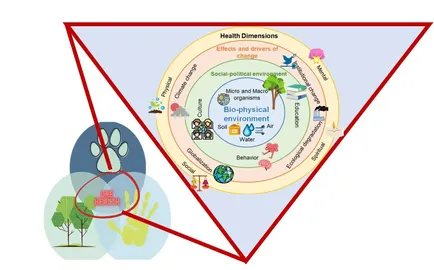One Health Day 2022 at ZEF: Reflections on the present and future of the approach
April 05, 2023.
Speakers and participants of the One Health Day symposium held at ZEF on November 3, 2022 critically reflected on the directions and perspectives for One Health. They did so by revisiting the concept and discussing presentations of ongoing research at ZEF. The researchers pointed to areas receiving much public attention, such as zoonotic diseases and anti-microbial resistance. But they also referred to neglected areas like the valuation of health for non-human beings and animal-environment health interactions. The scope was widened by looking at the overlaps of One Health with other integrative concepts such as Planetary Health, and by reconsidering integrated perspectives to assess the impacts of geopolitics and the political economy on health. Speakers also called for a closer look at how sustainable current One Health developments are, how to broaden conceptional notions of health and well-being, and how to include gender-sensitive approaches. Two highlights of the research symposium were: The critical assessment of One Health developments and the introduction to the concept of an antibiotic footprint.
Revisiting the One Health concept
Walter Bruchhausen from the Public Health Institute of the University Bonn (IHPH) talked about the latest developments of the One Health concept. On the one hand, the concept can be important to raise awareness about topics that have been neglected; on the other hand, the use of the term One Health is impregnated with ambiguity and confusion. This can make groups such as animal rights activists desert from advocating for the approach. Bruchhausen concluded his address by pointing out some areas to be considered research priorities for One Health: (1) the transmission of anti-microbial resistance, (2) spill-over of
zoonotic diseases, (3) control of zoonotic and vector-borne diseases, (4) food and water safety, and (5) the threats to food security from animal and plant diseases.
One Health, anti-microbial resistance, and geopolitics
IHPH-director Nico Mutters delivered his address on the general micro-One Health idea, particularly about the development of antimicrobial resistance. The latter can spread from different environments to humans, animals and plants, and poses serious risks to health. Geopolitics and political economy can play a crucial role in antimicrobial resistance transmission. Thus, if we look at the antibiotic footprint of different countries, data from the AntibioticFootprint.net initiative of the Mahidol-Oxford Tropical Medicine Research Unit shows that antibiotic consumption per person is notably higher in European countries than in any other region in the world. However, resistance currently spreads at a higher pace in South Asia. This indicates that there is only a slight correlation between antibiotics consumption and resistance and that poorer infrastructure and poorer governance can lead to higher antibiotic resistance.
The directions of One Health research at ZEF
At present, there are 18 doctoral research projects within the framework of the One Health Graduate School at ZEF. There is a strong focus on environmental transformations and the way they affect human health and well-being as well as urban health resilience. Important additions to the second phase of the Graduate School (2021-2024) are the inclusion of a gender perspective, strengthening research on the governance and implementation of One Health initiatives, and targeting the research on anti-microbial resistance to tackle food safety in plant-based diets.
Further reading: Read the full report on the ZEF website at: https://bit.ly/OneHealthDay22
Funding: The NRW Forschungskolleg “One Health and Urban Transformation” is funded by the Ministry of Culture and Science of North Rhine-Westphalia (Ministerium für Kultur und Wissenschaft des Landes Nordrhein-Westfalen, MKW).
Authors:Ana Maria Perez and Max Voit are working with the Forschungskolleg “One Health and Urban Transformation” at ZEF.
Contact:health(at)uni-bonn.de
This article was published in ZEF News No. 46.


